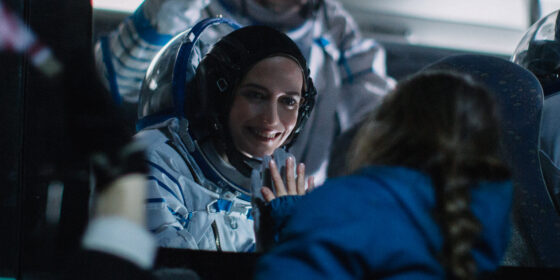Proxima ( Alice Winocour, Germany/France) — Platform

By Mark Asch
A feature-length version of the scene in Robert Zemeckis’ Contact (1997) in which an astronaut’s teary-eyed daughter begs her daddy not to go into space, Alice Winocour’s Proxima follows Eva Green as she juggles parenting an eight-year-old and preparations for a year aboard the International Space Station. Sarah (Green) shares custody of Stella (the very effective Zélie Boulant-Lemesle) with her ex (Lars Eidinger), but it’s Sarah who puts Stella to bed every night with a countdown to liftoff and a kiss (“first stage separation, second stage separation”). Stella is clearly inspired by Sarah—she has her newspaper clippings on the wall—but from the way she pouts and plays under the table during mom’s meetings, it’s equally clear that she’d rather be inspired by someone else’s mom and have Sarah to herself.
Winocour (who has a daughter about Stella’s age) can dramatize the impossible work-life push-pull in ways that feel overdetermined: e.g., there’s a very “Cat’s in the Cradle” scene of Sarah watching an emailed cameraphone video of her daughter learning to ride a bike. Likewise, the foreign auteur’s go-to American Matt Dillon is a bit too inevitably cowboy-voiced as the NASA rocket jockey who jokes that Sarah will cook for the rest of the satellite’s crew. But Proxima is at least as procedural as it is populist (heterogenous though the mix may be, and despite an unnecessarily goosed ending). For the most part, it’s unemphatic about its story arc, and gratifyingly in-between in its moods. Sarah’s voiceover tries to convey to Stella the excitement she feels at her work, and it is smarly intercut with both reminders of home and training montages that have an engrossed, get-that-in-the-movie flatness: zero-G jogging in a vertical treadmill and harness, underwater spacesuit training, practice grabbing with robotic arms, as well as incidental PR grooming and smiles for the camera.
Between Proxima and the subjective-headspace thriller Disorder (2015), with Matthias Schoenaerts and Diane Kruger, Winocour has proven she has a talent for eliciting task-oriented movie-star performances in versatile modes, and Green gives a very audience-unaware performance that’s mostly a matter of going along with the team and getting on with the work at hand. (Another talented person doing unobtrusive work: composer Ryuchi Sakamoto.) Sometimes Sarah and the rest of her crew get along, sometimes not (Dillon’s character is less sexist when Stella’s around); sometimes she’s one of the boys, dreaming of the stars and glory, and sometimes she has to prove herself, demanding more G-force in the centrifuge as her cheeks flatten. With dialogue in French, German, Russian and English, and shot in real space-exploration facilities in Russia and Kazakhstan, Proxima is an international co-production about international co-operation; the prevalence of sexist microaggressions in this ostensibly technocratic-utopian milieu is potentially another, more implicit autobiographical element from Winocour.
Mark Asch- « Previous
- 1
- 2


